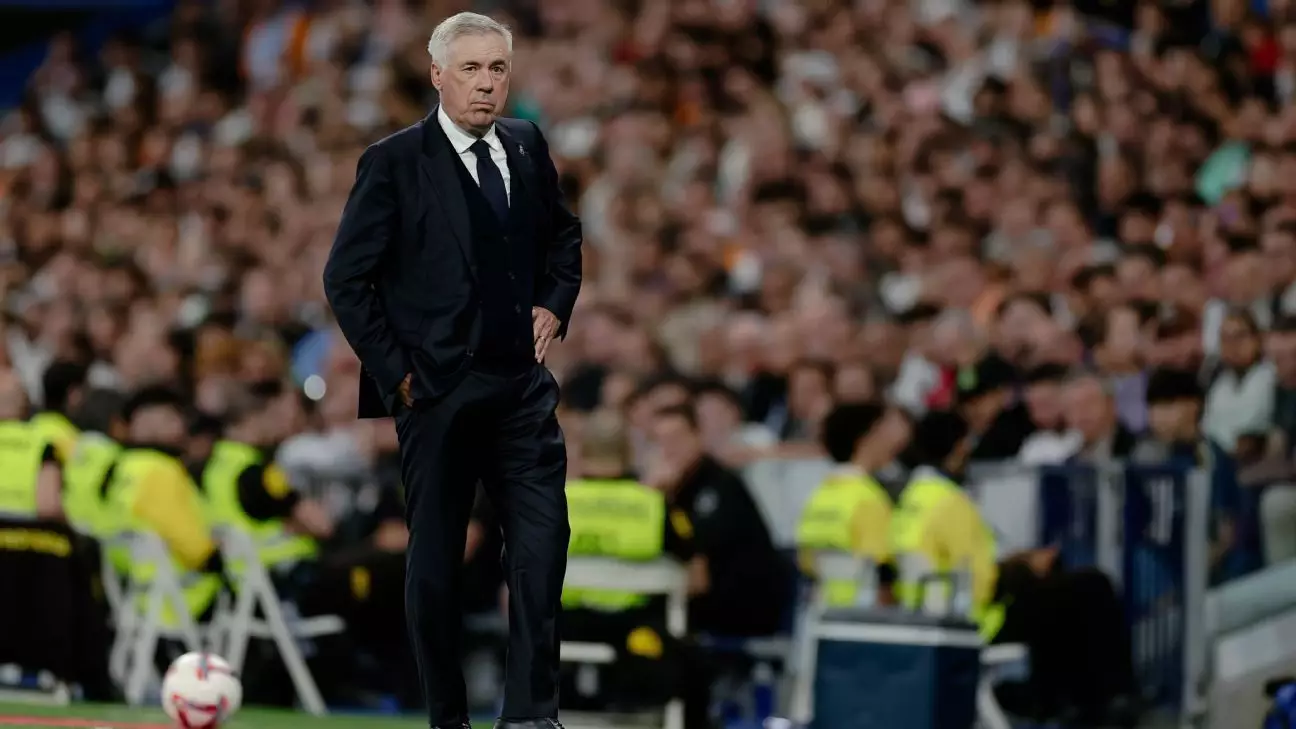The catastrophic flash floods in Valencia have triggered a collective heartache felt across Spain, with at least 217 lives lost and entire communities devastated. As Real Madrid’s Carlo Ancelotti articulated in a recent press conference, the aftermath of such tragedies raises profound questions regarding the appropriateness of continuing with professional football in the affected regions. The decision of LaLiga’s governing officials to proceed with most scheduled matches instead of universally pausing all activities has led to widespread debate, illustrating the complex relationship between sports and societal responsibility.
The floods, which have been deemed one of the most severe natural disasters in Spanish history, prompted LaLiga to suspend certain matches but allowed others to continue, thus highlighting the inconsistency in leadership responses during crises. Ancelotti’s comments resonate deeply as they encapsulate the struggle between the essence of football as entertainment and the undeniable reality of collective suffering. The sentiment that football should be set aside during such hard times challenges the often unwavering dedication to the sport, emphasizing a deeper humanity in the face of devastation.
In light of the floods, numerous players and coaches have voiced their concern regarding the scheduling decisions made by LaLiga. Coaches like Atlético Madrid’s Diego Simeone have described the continuation of matches as nonsensical, reflecting a shared sentiment among the coaching community that prioritizes people over profits. The frustration that permeates the ranks is palpable; Ancelotti stated, “Nobody wanted to play,” reinforcing the notion that the feelings of those directly involved in the sport were sidelined in this pressing situation.
This commentary highlights a significant disconnect between administrative decisions and the realities faced by those on the ground. The pursuit of financial stability and normalcy in the sporting calendar often overshadows the pressing need to recognize the human element that defines communities affected by tragedies.
Ancelotti also touched on an internal struggle that many players face: maintaining professionalism while navigating emotional turmoil. As preparations shifted towards their upcoming Champions League match against AC Milan, the challenge of focusing on sport amidst grief and loss became evident. The coach astutely noted that “Your head isn’t in your work,” reflecting a universal truth among athletes who grapple with a dual obligation: to perform at a high level while processing devastating news.
The psychological impact on players in moments like this cannot be understated. Ancelotti’s acknowledgment of the difficulty in maintaining focus underscores a crucial aspect of athlete mental health that is often overlooked. Emphasizing the need for a collective pause not only addresses immediate sympathies but also reflects a growing recognition of mental well-being in professional sports.
Ancelotti’s candid remarks also illuminated the troubling reality of governance in professional sports, where the influence of players and coaches is diminished in matters of scheduling and decision-making. He admitted, “The power we have is equal to zero,” reinforcing the idea that those in administrative roles often prioritize commercial interests over ethical considerations. This power imbalance raises important questions about how sports organizations should operate in situations that demand a pause for reflection and empathy.
The consistent refrain from players that their voices hold little weight in significant decisions concerning public sentiment indicates a call for more inclusive governance in sports. With the sports sector often billed as a leader in community engagement, there is an urgent need for leadership that considers the broader implications of sports in society, especially during instances of tragedy.
The Valencia floods, while tragic, present an opportunity for reflection and potential growth within the realm of Spanish football. As stakeholders—from players to coaches to administrators—grapple with their responsibilities in the wake of such disasters, the hope lies in a more unified and compassionate approach toward decision-making.
Ancelotti, along with many in the football community, has reminded us that while football brings joy and celebration, it is essential to prioritize humanity. In moments like these, the sport must not only be a source of solidarity but also a platform for hope and healing, embodying the resilience of the affected communities and keeping the spirit of empathy at the forefront. The real victory lies not just on the pitch, but in how those involved respond to the world outside, transforming tragedy into a unified call for compassion and action.

